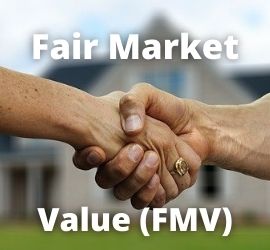What Is Fair Market Value (FMV)?
 FMV or Fair Market Value is the price that a willing buyer will pay to a willing seller. It further assumes that both parties are knowledgeable and unrelated and neither is forced to make the deal.
FMV or Fair Market Value is the price that a willing buyer will pay to a willing seller. It further assumes that both parties are knowledgeable and unrelated and neither is forced to make the deal.
Fair market value (FMV) in real estate is the determined price that a property will sell for in an open market. The FMV is agreed upon between a willing buyer and seller, both of whom are reasonably knowledgeable about the property in question.
Fair Market Value is very similar to market value. The fair market value of a company’s stock refers to the price at which the stock is currently trading or the price a company will issue stock to its employees. This valuation is used by the IRS to calculate how much tax an employee owes on any equity compensation they receive.
In other words, FMV is the price that any asset would sell for on the open market. Fair market value has come to represent the price of an asset under the following usual set of conditions:
- Well informed – prospective buyers and sellers are reasonably knowledgeable about the asset,
- Best interest – Each party is behaving in their own best interest,
- No coercion – free of undue pressure to trade, and
- No time pressure – given a reasonable time period for completing the transaction.
Given these conditions, an asset’s fair market value should represent an accurate valuation or assessment of its worth. The term is commonly used in tax law and the real estate market.
Fair Market Value (FMV) – A Closer Look
The term, fair market value, is slightly different from similar terms such as market value or appraised value. This is because it considers the economic principles of free and open market activity in addition to the valuation.
- Market value – simply refers to the price of an asset in the marketplace. For example, a home’s market value can easily be found on a listing. However, the fair market value is more difficult to determine.
- Appraised value – refers to an asset’s value in the opinion of a single appraiser. Therefore, an appraisal does not immediately qualify as fair market value. In cases where a fair market value is needed, however, an appraisal will usually be a good starting point.
- Intrinsic value – is the actual value of a property or asset. It is based on analytical techniques and underlying perceptions of its tangible and intangible factors. Intrinsic value might or might not be the same as the fair market value. For example, investors analyze securities in the hope of finding a bargain. These are investments where the true or intrinsic value of the investment exceeds its current fair market value.
Assessing Fair Market Value (FMV)
There are four basic methods of determining fair market value.
- Cost or selling price. If the item has been recently bought or sold, that can be a good indicator of its fair market value.
- Sales of comparable assets. When a real estate agent presents a prospective home seller with a list of recent sales prices for similar nearby homes, it is known as comparables. This is a way of determining fair market value. You can compare the property in question to other properties with similar features. The same can be done for other assets, including coins, classic cars, and jewelry. It is a matter of finding another item like yours and learning the price at which it has recently sold.
- Replacement cost. This may come into play when settling an insurance claim as well as preparing a tax return. It refers to what it would cost to buy or build a similar property or asset.
- Expert opinion. When you hire a professional appraiser to give you a value on a piece of property, the resulting figure is considered fair market value. At least, in that particular expert’s opinion. However, a certified professional with training and experience appraising an item or property can help determine the market value. It’s important to work only with an appraiser who regularly assesses the worth of whatever it is you are trying to evaluate. For example, if you want to know the market value of a diamond, seek out an appraiser who works with diamonds and gemstones.
Fair Market Value (FMV) and Taxation
Worldwide tax authorities strive to ensure that transactions are realized at FMV, at least for tax purposes. For example, a father who is retiring may sell the shares of his business to his daughter for $1 so that she can carry on as the owner of the family business. However, if the FMV of the shares is higher, the Internal Revenue Service (IRS) may well recharacterize the transaction for tax purposes. As a result, the father will need to pay taxes on the disposition of the shares as though he had sold them at FMV to a third party.
Another field of taxation where FMV regularly comes into play is the charitable donation of property. This might include automobiles, artwork, or real property to charities. In these cases, the donor usually receives a tax deduction for the value of the donation. Tax authorities need to ensure that the credit given is for the true FMV of the object. Charities often ask donors to provide independent valuations for their donations.
Property Taxes
Municipal property taxes are usually assessed based on the FMV of the owner’s property. Depending on how long the owner has owned the home, the difference between the purchase price and the residence’s FMV can be substantial. Professional appraisers use standards, guidelines, and national and local regulations to determine a home’s FMV. If you have owned your home for a long time and the FMV has gone up, your taxes will likely be a lot higher than they were when you purchased it.
The value of your home can also impact your gift tax, estate tax, tax credit, and tax deductions after a casualty loss. For example, if you plan to gift your home or include it in an inheritance, then the person who inherits your home will have to pay taxes on the fair market value of the property. If the person chooses to sell the house and gets more for it than the value at which it was assessed in the inheritance, then they will have to pay capital gains tax on the difference between the sales price and the fair market value.
The Bottom Line
There is no exact formula to determine the fair market value of an asset. An appraiser should be able to help homeowners and people looking to sell their homes to determine the appraised value. Then, a real estate agent or a tax lawyer can help you to learn more about pricing your home. Make sure to take into consideration both the market value and the fair market value.
- Fair market value isn’t calculated by a set formula; there are a variety of ways to calculate FMV.
- The most important characteristic of determining FMV is that a buyer and seller are willing to agree on what a piece of property is worth.
- Fair market value is also important for calculating property taxes, insurance claims, and settling legal disputes where the property is involved.
It’s important to assess the fair market value of an item that you buy or sell as it can have a large impact on your finances. Correctly applying fair market value to taxes ensures there won’t be adverse monetary implications later on or any claims of fraud by authorities.
Up Next: What Is a Schedule F: Profit or Loss from Farming?
 Schedule F (Form 1040) is used by farmers who operate as sole proprietors to report their farming income and claim their expense deductions.
Schedule F (Form 1040) is used by farmers who operate as sole proprietors to report their farming income and claim their expense deductions.
If you are a farmer and your farming business is a sole proprietorship, you must use Schedule F. Schedule F attaches to a 1040 tax form to report your profit or loss from farming for the previous tax year. Farm income includes funds derived from enterprises operating in livestock, dairy, poultry, fish, fruit, or vegetables. It also includes income earned from a plantation, ranch, range, orchard, grove, or nursery specializing in ornamental plants.
Your farming profit or loss is listed on Schedule F and then transferred to a form 1040 for computing your total tax liability. Schedule F is to farmers what Schedule C is to other sole proprietors.




